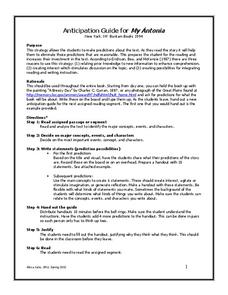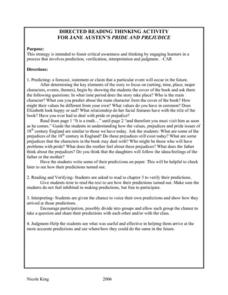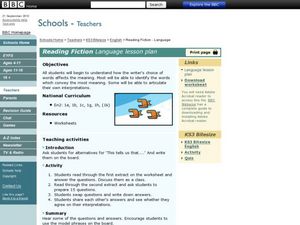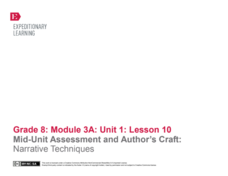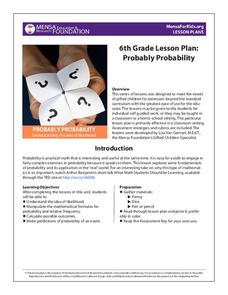Curated OER
Personal or Social Tragedy? A Close Reading of Edith Wharton's Ethan Frome
Students complete close reading activities to analyze Edith Wharton's Ethan Frome. In this literary analysis lesson, students analyze key quotations from Ethan Frome and respond to contemporary reviews of the text. Students use textual...
Curated OER
Reading Miss Lady Bird's Wildflowers
Students discover the impact "Lady Bird" Johnson had on America by reading a short biography. In this historical persons lesson, students read a multi page biography of the former first lady and write a summary of her life's work....
Curated OER
Bud, Not Buddy: Anticipation Guide
Hoover flags? Hoover blankets? Hoovervilles? Drawing upon prior knowledge of the Great Depression class members respond to the prompts on an anticipation guide for Bud, Not Buddy, Christopher Paul Curtis’s tale of Bud Caldwell’s quest to...
Curated OER
My Antonia: Anticipation Guide
Making predictions is an important skill that experienced readers tap into when tackling a difficult text. Prepare your pupils to read My Antonia by Willa Cather with an initial prediction activity and this anticipation guide, which...
Curated OER
Nothing But the Truth: Anticipation Guide
“What does it mean to be patriotic?” “Should grades factor in to a student’s eligibility for extracurricular activities?” Class members complete an anticipation guide that asks them to respond to a series of statements that highlight...
Curated OER
Directed Reading Thinking Activity: Cold Sassy Tree
Lots of questions arise when reading Cold Sassy Tree. As your class encounters the twentieth chapter, encourage a rich discussion with some of the questions provided here. Then, either independently, or for homework, ask your readers to...
Curated OER
Pride and Prejudice: Directed Reading Thinking Activity
Can you judge a book by its cover? Decide who and what Jane Austen's Pride and Prejudice is about with a prediction activity. Before reading the first three chapters of the book, kids answer questions based on their interpretation of the...
Curated OER
Reading Fiction
Explore how a writer's choice of words can convey meaning to the reader. Learners read selections and write questions about the content. Each question is answered by two groups of students and the differences in interpretations are...
Curated OER
Teaching Grammar Without the Hammer: Five Fun Activities
There are five lessons on teaching grammar here for you to peruse. Two of them work well for kindergartners; one on teaching synonyms and one on teaching parts of speech by reading Tall Tales. These lessons are especially engaging and...
Curated OER
Sexual Abuse: Sequoia's Story Discussion Guide
The subject matter of this lesson is intended for a mature academic audience. Please review to determine if it is suitable for your class. Students create a working definition of sexual abuse, read a scenario, and then break up into...
Curated OER
Novel Study: The End of the Line
The End of the Line, Angela Cerrito's gripping novel about an adolescent murderer incarcerated in an unusual "school," is the subject of a comprehensive set of support materials. Chapter vocabulary and discussion questions are excerpted...
NASA
Raisin Bread Universe
What is the universal breakfast? The resource includes two activities, the first one observing oatmeal to understand the texture of the universe. Then, scholars measure raisin bread dough before and after it rises to represent the...
Curated OER
The Very Hungry Caterpillar
Learners complete various activities related to the book "The Very Hungry Caterpillar." They participate in a shared reading activity, read and write a sentence for each day of the week, draw a picture of the caterpillar eating one of...
Museum of the American Revolution
Dissecting the Declaration
Delve into the past to understand the issues that led to the Declaration of Independence. Academics read excerpts from the Declaration of Independence and take a virtual tour of the American Revolution Museum. The resource explains how...
Core Task Project
Whatif by Shel Silverstein
What a skillful way to incorporate Shel Silverstein, a wonderful author, into the classroom. Composed of three tasks, children are led through a series of text-dependent questions that force them to unveil the meaning of Silverstein's...
Mrs. Hodges' Social Studies Classes
I Have Rights?!
Do young people have rights in the United States? Your pupils will not only learn the answer to this important question, but will also build vocabulary through cloze activities and gain a thorough introduction to the Bill of Rights.
EngageNY
Building Background Knowledge: “War in the Pacific,” Part 2
Who did what? Readers take a closer look at War in the Pacific to determine each country's actions. As they read, scholars underline American actions in one color and actions of Japan in another. They then begin completing Pearl Harbor...
EngageNY
Mid-Unit Assessment and Author’s Craft: Narrative Techniques
Scholars work together to compile a list of things good writers do to perfect their craft and write the ideas on a whiteboard. They then discuss the differences between passive and active sentences and use their knowledge to identify...
School Improvement in Maryland
Analysis of Marbury v. Madison
Should the United States Supreme Court have the power of judicial review? Instructors guide class members through a review of Marbury v. Madison and assist class members in writing a brief of the case. As independent practice,...
Center for Civic Education
What Basic Ideas About Government Are Included in the Preamble to the Constitution?
Young historians explore the meaning of the Preamble to the US Constitution in this upper-elementary social studies activity. Working with partners or in small groups, children discuss the purpose of government before reading and...
MENSA Education & Research Foundation
Probably Probability
Reinforce the concept of probability with a series of lessons highlighting the idea of likelihood, probability formulas, relative frequency, outcomes, and event predictions. The collection is made up of four lessons offering informative...
US House of Representatives
Keeping the Faith: African Americans Return to Congress, 1929–1970
The third lesson in a unit that traces the history of African Americans serving in the US Congress examines the period from 1929 through 1970. After reading a contextual essay that details the few African Americans elected to Congress...
US House of Representatives
Permanent Interests: The Expansion, Organization, and Rising Influence of African Americans in Congress, 1971–2007
The fourth installment of the seven-instructional activity unit focused on African Americans elected to and serving in the US Congress looks at the period from 1971 through 2007. Class members read a contextual essay that provides...
Museum of the American Revolution
The Ongoing Revolution
America: a nation that continues to change. Budding historians analyze primary sources to understand the key ideas of the American Revolution and how the country has changed over time. Scholars read text from the Declaration of...





